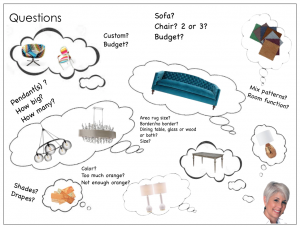Welcome to your go-to resource for everything you ever wanted to know about interior decorating. Whether you’re revamping a room or starting from scratch, the world of home decor can feel overwhelming. But fear not! I’m here to answer your burning questions and guide you through the maze of design styles, color choices, and space planning.
Understanding Interior Decorating
Interior decorating is an art that balances aesthetics with functionality. As a long-time enthusiast and practitioner, I’ve learned that asking the right questions is crucial in achieving a cohesive look in your home. Let’s dive into some of the most frequently asked interior decorating questions and their insightful answers.
Common Interior Decorating Questions
1. What is the difference between interior decorating and interior design?
While both fields focus on enhancing the aesthetics of indoor spaces, there are some key distinctions. Here’s a quick comparison:
| Aspect | Interior Decorating | Interior Design |
|---|---|---|
| Purpose | Enhance the visual appeal of a space | Functional and aesthetic optimization |
| Education | No formal education required | Formal education and licensing required |
| Focus | Furniture, fabrics, color schemes | Space planning, architecture, and functionality |
2. How do I choose a color scheme for my room?
Choosing a color scheme can be daunting, but consider utilizing the 60-30-10 rule: 60% of the room should be a dominant color, 30% a secondary color, and 10% an accent color. Here are steps to help you choose:
- Start with a color you love.
- Consider the room’s purpose and natural light.
- Use color swatches to visualize combinations.
- Test paint samples on your walls before committing.
3. What are some popular trends in interior decorating?
Keeping up with current trends can greatly influence your decorating choices. Some popular trends include:
- Biophilic design (bringing nature indoors)
- Minimalism and decluttering
- Bold patterns and colors
- Multi-functional spaces

4. How can I make a small room look larger?
Creating the illusion of space in a small room is easier than you think. Here are some tips:
- Use mirrors to reflect light.
- Stick to a light color palette.
- Opt for furniture with legs to create a sense of openness.
- Keep window treatments light and airy.
Design Principles to Consider
Understanding fundamental design principles can drastically improve your decorating choices.

1. Balance
Balance involves distributing visual weight within a space. This can be achieved through:
- Symmetrical Balance: A formal arrangement with equal elements on both sides.
- Asymmetrical Balance: An informal arrangement that achieves balance through contrast.
2. Focal Point
Every room should have a focal point—this could be a fireplace, an art piece, or a striking piece of furniture. Here’s how to create one:
- Choose a standout item.
- Arrange furniture to highlight the focal point.
- Use lighting to draw attention to the feature.
3. Scale and Proportion
Scale refers to the size of objects in relation to each other and the space, while proportion focuses on the relationship between different objects. Keep these tips in mind:
- Mixing large and small items creates visual interest.
- Consider the height of ceilings when selecting furniture.
4. Rhythm
Rhythm keeps the eye moving throughout a space through repetition of elements. You can create rhythm by:
- Using a consistent color palette.
- Incorporating repeated patterns in textiles.
- Aligning furniture and decor according to a visual path.

Personal Experience: My Favorite Decorating Tips
Throughout my years of decorating, I’ve picked up several tricks that make the process enjoyable and less daunting:
1. Start with What You Have
Before investing in new décor, assess what items you already own. Sometimes, rearranging existing furniture or giving old pieces a fresh coat of paint can lead to stunning transformations.

2. Don’t Be Afraid of Mixing Styles
Contrary to popular belief, mixing different decor styles can yield beautiful results. I’ve found that combining modern and vintage items can create a unique character in a space.
3. Incorporate Personal Touches
Adding personal memorabilia or art can make a space feel inviting and warm. A gallery wall with family photos or a travel-inspired shelf can serve as conversation starters.

FAQs about Interior Decorating
What are some affordable ways to decorate my home?
Consider DIY projects, thrift store finds, and upcycling to save money while still achieving a beautiful look.
How can I create a cohesive look in my home?
Using a consistent color palette and theme across different rooms will help establish a unified look.
What should I prioritize when decorating a room?
Begin with the room’s function, then focus on furniture placement, color scheme, and personal touches.
Can I hire an interior decorator on a budget?
Yes! Many decorators offer hourly consultations or package deals to suit various budgets.